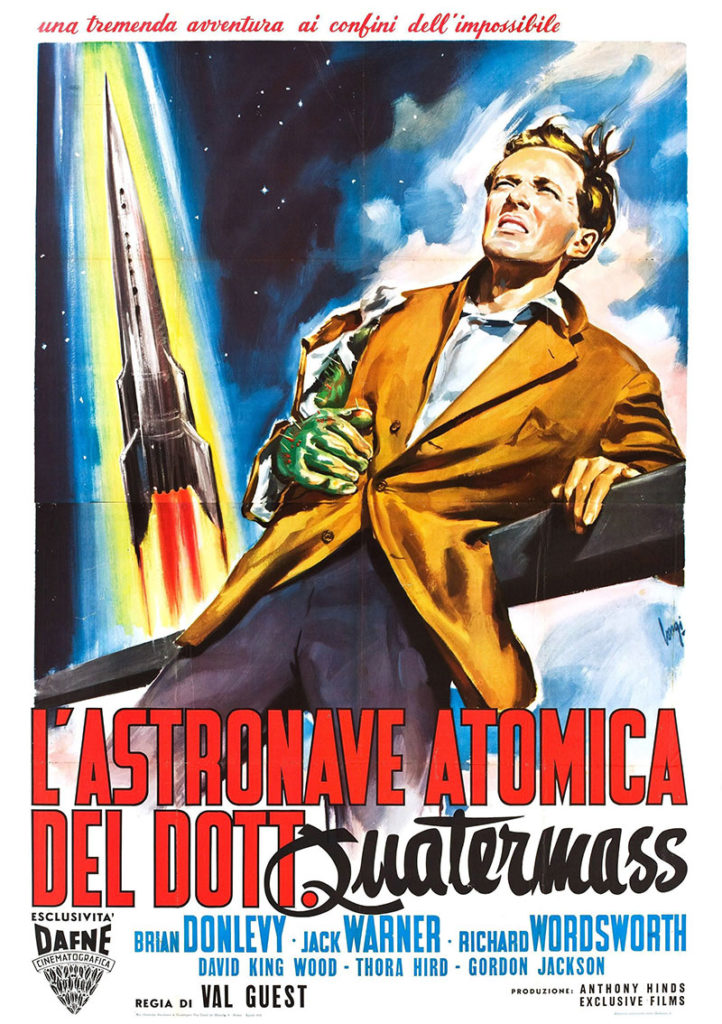The Curse of Frankenstein may have been the first huge payoff for Hammer Film Productions after they made the transition to horror, but it was The Quatermass Xperiment (released in the United States as The Creeping Unknown) that started the company down the path to becoming a legend in the horror genre.
The Quatermass Xperiment is a 1955 remake of the show of the same name that aired on British television in 1953. This adaptation was written by Richard Landau and Val Guest, and helmed by Guest.
In the near future, sometime before sirens replaced bells on British emergency vehicles, a rocket crash-lands in the English countryside. The rocket was launched by a government department headed by the brusque and uncompromising Professor Bernard Quatermass (Brian Donlevy). Quatermass arrives at the scene of the crash and takes immediate charge. Three men that he sent into space are inside the rocket, and Quatermass is desperate to rescue them. The rocket is breached, but there is only one survivor, Victor Carroon (Richard Wordsworth).
Carroon is incoherent. The only words he manages to form are a painful plea for help. His condition is such that no hospital can help him, so Quatermass begins to study Carroon. Some affliction is traveling through Carroon’s body, setting off some kind of transformation. It doesn’t become clear to Quatermass and a detective from Scotland Yard, Lomax (Jack Warner), just what is happening to Carroon until lab experiments confirm Carroon is infected with an alien organism  that has the potential to absorb all life on the earth. After Carroon escapes into the London night, it becomes imperative he be found and destroyed before be begins spawning more creatures.
that has the potential to absorb all life on the earth. After Carroon escapes into the London night, it becomes imperative he be found and destroyed before be begins spawning more creatures.
This film is pure 1950s sci-fi schlock. It may not have come out of Southern California — if it had, one can be sure it would have featured a shot or two of Bronson Canyon — but the rest of the pedigree is there. There’s a rocket ship; a scientist to provide exposition, and, in this case, double as the film’s hero; and a prop monster that may have been made from modeling clay or foam rubber (it’s not clear which). In ways too numerous to mention, The Quatermass Xperiment is indistinguishable from the period work of Bert I. Gordon or Roger Corman. It is better, though.
Val Guest didn’t have much of a budget to work with, and it shows. This film made a passing attempt at being a monster flick, but in order to have succeeded at that, there would have had to have been much more monster. Carroon is nicely creepy in the runup to his metamorphosis, but afterwards much of the creature’s activity is conducted by hearsay. That’s too bad, because the ideas behind this film are quite good.
Another thing I noticed was the length of filler and dialog-only scenes, especially during the first half of the film. The filler was done to pad the running time, but the talking scenes remind me of older BBC shows. Lacking the budget to make shows where things actually happen, writers were forced to pen excruciatingly long scenes with nothing but dialog. For an example, look back to Colditz, from the 1970s. That show is about British POWs in World War 2 trying to escape from a medieval castle, which should have been exciting. But it was ruined for me by interminable scenes of dialog — the kind that would give Quentin Tarantino the vapors.
Things don’t get that bad in this film, but the pace in the first half needs a swift kick.
The performances from the cast were mediocre without being offensive. Being from the 1950s, much of the style and direction of the performances can be put down to the time, but Donlevy is no scientist. I could buy him in the role of an authority figure, sure — walking briskly from one scene of trouble to the next — but a scientist? Not in a million years, and not from the moment he mispronounced the word ‘metabolic.’
Compared with its contemporaries, The Quatermass Xperiment is on the right side of being entertaining, but its shelf life ended long ago. Its science was out of date before the film was a decade old, and very little was done with the film’s monster. I have little doubt that had Hammer not become what it did, this film would be very obscure. As it is, its heritage as the progenitor of Hammer horror has earned The Quatermass Xperiment a place in film history.
